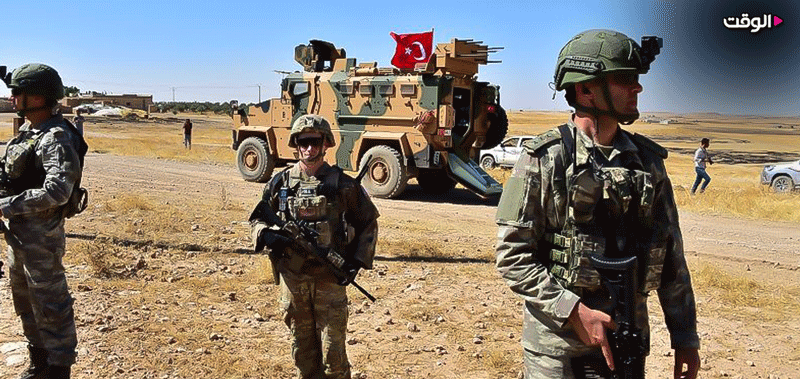Alwaght- With the start of the Ukraine war, the West took steps to build an alliance against Moscow to ground Russia militarily and isolate it politically on the world stage. One NATO and West resort was forcing a change in the status of the Russian relations with its neighbors from stagnant to active tensions.
Turkey, meanwhile, is one of the countries that despite its attempts to walk a tightrope between the two sides of the conflict is leaning towards escalated tensions with Russia.
In recent years, Turkey, in line with its ambition for transformation into a new power with a role in Central Asia and Caucasus, West Asia, and North Africa, has sought to pursue a pragmatic policy of balanced relations with the Western and Eastern powers, amid unfolding political and geopolitical competitions.
Although the adoption of such an approach has, at times, led to an increase in Ankara's maneuvering power in foreign policy to deal with the dynamics of the international system and regional and international developments, experience has shown that the Turkish President Recep Tayyip Erdogan has, again at times, also shown to be confused about how to advance this policy in the context of crises.
The latest example of his foreign policy confusion is seen in his Ukraine approach. On the one hand, Ankara condemned Russia's military campaign in Ukraine, closed the Bosphorus and Dardanelles straits to Russian warships, and even sent some military aid to Ukraine in an attempt to show itself aligned with NATO's positions in support of Ukraine. On the other hand, Western anti-Russian sanctions, which have been the West's most important deterrence and punishment against Moscow, have not been explicitly recognized by Turkey, and Ankara continues to trade with Moscow.
The reason for this approach should be sought in the trade and economic figures between the two countries. Russia is a vital trading partner for Turkey's crisis-ridden economy, which supplies 45 percent of its natural gas and 70 percent of its wheat. Wheat is especially high-priority commodity in terms of imports, as rising bread prices have been a major source of discontent in Turkey in recent months. Russia is also Turkey's largest origin of tourists, with 4.7 million Russian visitors accounting for 19 percent of the country's total number of tourists in 2021.
Still, even the vaciliating approach of siding with the Western pressures and maintaining the links with Moscow have not been able to fully contain possible tensions with Russia.
In recent weeks, the media repeatedly reported on strikes in Ukraine against Russian military positions by Turkish-provided drones, in particular the sinking of a Russian warship allegedly hunted by the Bayraktar drones. And on Monday, Ankara said it closed its airspace to Russian flights to Syria.
Also last week, during mortar shelling of Kurdish areas in northern Syria by the Turkish army, eyewitnesses reported that some areas near the Russian military base in the al-Mubaqir, Tal Shanan, and Al-Dardara villages on the outskirts of Tal Tamr district of Hasakah province in the northwest were targeted.
Apparent enough, Erdogan, based on his Eurasian strategy, hopes to see the end of the crisis between Turkey's two big business partners as soon as possible, but the longer the crisis lasts, the more difficult it will be for Ankara to continue its impartiality game, especially as US Treasury Secretary Janet Yellen on April 13 warned about flouting the anti-Russian sanctions in a speech to Atlantic Council. The warning was mainly aimed at China but also proved worrisome to Turkey.
It seems that the first consequence of their escalated tensions would be felt in Syria, where the two countries as two important actors have had many agreements under "de-escalation zones."
Russia's involvement in the Ukraine crisis and its military focus on the war can lead to reall of military wares and personnel from the Arab country. Some unconfirmed news have already suggested evacuation of some Russian bases in Syria – a development that can encourage Turkey to make new advances in northern Syria to implement its long-eyed plan of creating a 30-kilometer buffer zone into the Syrian territory.
The Russians have not been unaware, however. Maria Zakharova, the spokeswoman to the Russian foreign ministry, said: "We see the reasons for the current deterioration of situation [in northern Syria] in Turkey's chronic failure to fulfill its obligations under the Sochi agreement of 17 September 2018 and the transfer of Turkish-backed units from the so-called moderate armed opposition to northeastern Syria by Ankara."
Russia responded to the Turkish escalation with air and missile strikes on several points in Idlib, the last stronghold of Turkish-backed terrorist and opposition militias. These groups and Turkish army units were fast to respond, shelling Jurin Camp in Western Hama with artillaty, according to provincial sources. Jessore Institute for Studies described the Turkish escalation as an effort to demonstrate readiness to counter any military pressures from Russia whose influence in northeastern Syria has been considerably shrinking.
The Turkish measures in the upcoming weeks and months can reignite the war in the Syrian developments, though this may prove advantageous to the Syrian government and its allies in the Axis of Resistance. The advantages include expansion of Syrian army's presence in areas where it has so far had little presence and preparing for full liberation of the terrorist and foreign-held areas, especially Idlib.



























